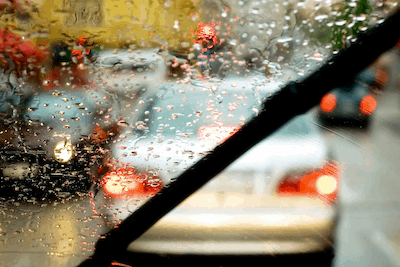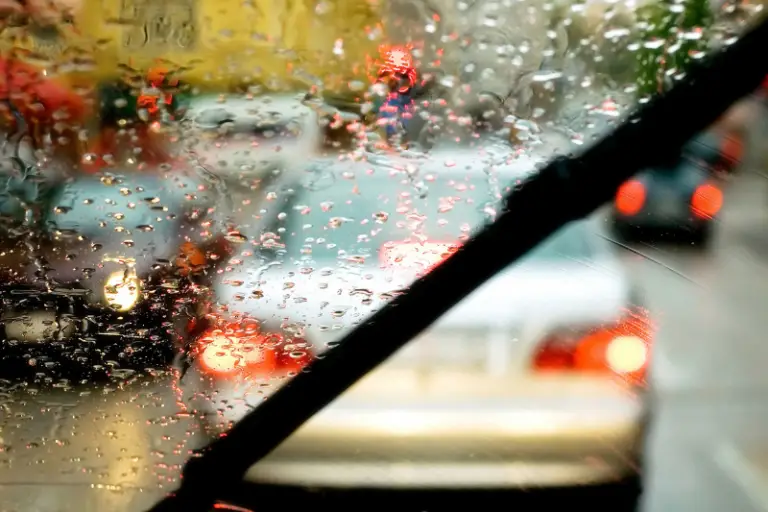Insurance Coverage for Leaking Windshields
Have you discovered a musky smell in your vehicle that hints at moisture leaking into the interior? Or perhaps you’ve noticed that your windows fog up more efficiently than ever before or see some tell-tell rust stains. A more noticeable sign might even be wet and spongy carpet in your vehicle. Having a windshield leak can be very frustrating and costly for drivers.
Will insurance cover a leaking windshield? If you have comprehensive car coverage, your policy should cover several types of water damage, but it will depend on the cause of the damage. It will not cover damage due to a maintenance issue but will most likely cover it if it’s due to a natural disaster, like hail. It can be hard to identify what is causing the water leak in your car, but once you’ve accomplished that, you can determine if your insurance policy will cover the cost or some of the cost of repair.
Determining the cause and the exact location of the leak can be quite a process. Just because a particular carpet area is damp doesn’t necessarily mean the leak is located in that same location. Confusing, right? We agree. That’s why we’re going to talk more about the causes of water leaks in vehicles, how to find them, how to fix them, and specific insurance coverage.
Possible Causes of Leaks in Your Windshield
 If you smell an odor or notice wet patches in the interior of your vehicle (and you haven’t accidentally left your windows open during a rainstorm), then you most likely have a leak. Once you’ve realized that you have water damage in your car, the next will be to identify where the damage originated.
If you smell an odor or notice wet patches in the interior of your vehicle (and you haven’t accidentally left your windows open during a rainstorm), then you most likely have a leak. Once you’ve realized that you have water damage in your car, the next will be to identify where the damage originated.
Determining what the problem is that’s causing the leak is vital for your vehicle. If it’s not found and fixed, you could come out with a nasty case of mold, rust, or mildew, which isn’t something you want to deal with in a car you drive often. Keep in mind that cars can slope in places so that a water patch could be coming from a higher vehicle area and pooling in that lower area.
Common Source of Windshield Leaks
A leak that is relatively common to see in vehicles comes from a seam hidden behind the molding of the windshield. This hard-to-notice pinhole can cause larger leaks than you might think if the seal is malfunctioning or not as strong as it should be.
Another hard to notice leak could stem from a replaced windshield that never received a proper seal. This can cause leaks to come in, even if the windscreen is rolled up. If your car windshield has been replaced and you’ve been noticing a musky odor in your car, check that your windshield has proper seals.
Testing Your Windshield for a Leak
You can quickly test your windshield if you suspect there is a severe reason for water damage in your vehicle.
- First, drench your windshield in soapy water (from the outside to keep it less messy, of course).
- Use an air compressor or air nozzle to focus air at the edges of your windshield. If you can see new bubbles forming on the outside of the windshield, you leak.
- If you don’t have an air compressor, you can ask a friend or family member to spray down your windshield from the outside with water. As you sit inside your vehicle, you’ll be able to see if there is water dripping through. Even if it’s just a tiny bit, you’ll need to either get it fixed or replaced. Keep in mind that the lower the water pressure, the more likely it will be for the leak to show. If there’s super high water pressure, the water is more likely to glance off of the window rather than sinking in and testing if there are any leaks.
If you’re noticing the unusual wind noise in your car, it could be stemming from a leak. That’s another useful marker that you may need to test for a water leak in your windshields.
Fixing a Car Windshield Leak
Once you discover the leak, the next step will be to fix it yourself or find a local business to correct the problem. A professional is always a good idea when it comes to fixing any issues with your car. They are trained and experienced with car windshield leaks and will fix any problems or advise you on what you should do next.
Avoid Silicone Products for Windshield Repairs
If you plan on trying to fix it yourself, make sure to avoid silicone products. Since silicon’s nature is to expand or contract depending upon the weather, it doesn’t make a reliable sealant. And once it’s applied to a surface, it can be difficult to fix since other adhesives refuse to stick to silicone. The better option is to pick up a specialized sealant for window shields.
If you can’t find one locally, you should be able to find one online. These sealers are usually reasonably easy to apply since they come in a tube with to-the-point directions. If the leak is underneath the molding, you can usually briefly pull it aside, insert the sealer, and then push it back into place after a few minutes to let the sealant firm.
On the other hand, if there was a skip in the window shield sealant that caused an unfortunate leak, you will need to use a more pliable sealant. You will need a caulking gun for this type of sealant (extra points if it’s air pressure powered). In any case, you’ll want to re-try the water test after the sealant sits for a while.
If there’s no more water leaking through after you’ve sprayed the car down from the outside, then you should be good to go. If not, you can either try the sealant again or find a professional to take your vehicle. We recommend going to a professional to ensure the leak is sealed correctly.
Insurance Claims For Windshield Leaks
A collision claim is often filed when you’ve been in an accident with your vehicle. If there is damage or loss not related to a car crash, you will most likely file a comprehensive claim. Whether or not the insurance will cover or help you cover the cost of damage depends on your insurance and the cause of the windshield damage.
Comprehensive coverage is considered the “other than a crash or wreck” coverage, which will offer some protection from natural disasters and the like. Often comprehensive coverage will pay or help pay for damage caused by:
- Fire
- Flooding
- Theft
- Vandalism
- Explosion
- Falling objects
- Hail
- Weather
- Hitting animals
As you can see, not all damage due to water is covered. It usually must be caused by a natural disaster or a collision to be covered. It might be a minor problem. However, water damage can be one of the most problematic insurance claims to submit.
Having the appropriate type of policy is important for covering everything from water damage to door dings with car insurance. Your insurance policy will also cover a blown head gasket if it was caused by a covered incident.
Submitting an Auto Insurance Claim for Water Damage
These claims are incredibly complex. They include many exceptions or exclusions under your auto policy contract when water gets involved with property damage. Let’s say the water damage is because of a leak caused by the failure of something in your car. If you could have avoided this by taking the car in for regular maintenance, then your policy will exclude the damage.
You will want to look into the wear and tear policy that comes with your policy to check on your particular insurer. Still, this exclusion usually states that any damage done to the car due to the wear of time will not be covered. It’s a bummer but a vital thing to keep in mind. Getting regular maintenance on your car is essential in the long run when it comes to saving money.
Slow leaks are usually not covered due to the wear and tear policy. If you begin to notice a water leak in your vehicle, whether it’s been raining or you took it through a car wash, you will want to check it out as soon as possible. Vehicles should not have leaks in their windshields unless you have the windows down accidentally.
And speaking of leaving your windows down- always double-check that you have secured them. If you accidentally leave them down or cracked during a thunder or hail storm and your interior is soaked, don’t try to file a claim with your provider (unless they happen to cover that, which is very, very unlikely.). If you try to file an insurance claim, your company will probably offer neither full nor partial coverage.
In Conclusion
Most often, problems caused due to negligence will not be covered by insurance. This isn’t always pleasant or fun. However, it’s a great motivator to keep your car in the best shape (and your windows rolled securely down). When in doubt, the best option is to call a professional to fix any possible leak in your vehicle. If you are unsure if you can afford it without car insurance coverage, then follow our tips along with more research to try and DIY it.
Thank you for reading Answers for Everyone! Find more answers to life’s questions here.


